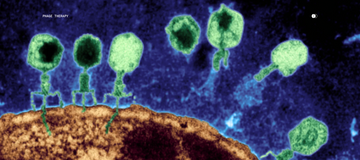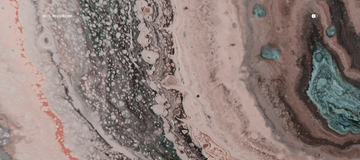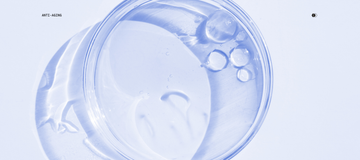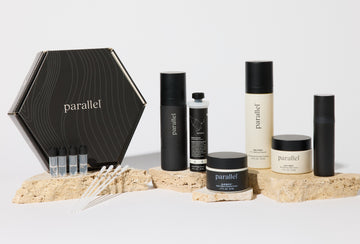For centuries, civilizations have known the ancient hair secret that beats all products – and modern science is finally catching up. Recent microbiome research reveals why our ancestors' simple hair care rituals often outperformed today's complex chemical formulations.
The Microbiome Revolution in Hair Science
Groundbreaking research published in the Journal of Investigative Dermatology has revealed that the scalp hosts a complex ecosystem of diverse bacterial and fungal species that directly influences hair health¹. This research validates what ancient cultures intuitively understood: healthy hair starts with a balanced scalp microbiome.
The scalp's unique environment—with its specific oxygen availability, sebum content, moisture levels, and abundance of hair follicles—creates distinct conditions for microorganism proliferation². Studies show that beneficial species of Cutibacterium acnes and Staphylococcus species account for approximately 90% of the bacterial microbiome in healthy scalps, while Malassezia yeasts represent about 90% of the fungal genera³.
Ancient Practices Meet Modern Science
The Fermented Rice Water Protocol
Traditional Asian hair care practices, particularly the use of fermented rice water by communities like the Yao women of China, have gained scientific validation. Research on rice water treatments has demonstrated measurable benefits for hair health⁴.
A study published in the International Journal of Cosmetic Science found that rice water may:
- Reduce surface friction between hair strands
- Increase hair elasticity
- Improve overall hair manageability
The secret lies in fermentation, which creates beneficial compounds that help maintain optimal scalp pH levels (between 4.5-5.5) and support healthy microbial communities⁵.
Natural Clay and Mineral Treatments
Ancient civilizations, from Egypt to Morocco, have long used mineral-rich clays for hair treatment. Modern research shows these traditional practices have scientific merit:
Rhassoul clay from Morocco contains high concentrations of:
- Silica (strengthens hair shafts)
- Magnesium (supports follicle health)
- Potassium (maintains scalp moisture balance)
These minerals work synergistically to cleanse without disrupting beneficial bacteria and provide essential nutrients for healthy hair growth⁶.
The Science of Simplicity
Why Less Is More: The Microbiome Perspective
Recent clinical studies reveal that excessive product use can disrupt the scalp's natural ecosystem. Research published in Experimental Dermatology found that maintaining scalp microbiome balance is crucial for optimal hair health⁷.
Key findings show that:
- Sulfate-free cleansing preserves beneficial bacteria
- Natural pH maintenance prevents microbial imbalance
- Gentle treatments support microbial diversity
The Role of Beneficial Bacteria
Studies have identified specific bacterial strains that promote hair health. Notably, research on Staphylococcus epidermidis has shown promising results for hair growth stimulation⁸. Scientists isolated active components including adenosine and biotin from beneficial scalp bacteria, which demonstrated efficacy in:
- Maintaining the hair growth (anagen) phase
- Reducing progression to the resting (catagen) phase
- Supporting overall follicle health
Modern Applications of Ancient Wisdom
Evidence-Based Natural Solutions
Clinical trials have demonstrated the effectiveness of various natural approaches:
Aloe vera: Research shows antimicrobial properties against harmful bacteria while supporting beneficial microorganisms⁹
Green tea extracts: Studies indicate potential for managing scalp conditions associated with microbial imbalances¹⁰
Fermented ingredients: Clinical evidence supports their role in promoting healthy scalp microbiome diversity¹¹
The Personalized Microbiome Approach
Just as Parallel Health revolutionizes skincare with personalized microbiome analysis, the same principles apply to scalp health. Understanding your unique scalp microbiome allows for:
- Targeted treatment protocols
- Customized natural formulations
- Precision pH balancing
- Microbiome-friendly product selection
The Cutting Edge: Precision Scalp Microbiome Therapy
Targeted Phage Therapy for Scalp Health
Recent breakthroughs in phage therapy represent the next frontier in scalp microbiome optimization. Research published in the International Journal of Molecular Sciences demonstrates that bacteriophages—naturally occurring nanomicrobes that target specific bacteria—can selectively eliminate pathogenic bacteria while preserving beneficial microorganisms¹².
A groundbreaking study on human scalp hair follicles found that treatment with specific lytic bacteriophages effectively modulated gene expression related to hair growth and development¹. This precision approach offers several advantages:
- Species-specific targeting without disrupting the broader microbiome
- Natural antimicrobial action that works with your body's systems
- Restoration of healthy microbial balance rather than broad-spectrum destruction
- Reduced risk of resistance compared to traditional antimicrobials
Custom Compounded Prescriptions: Personalized Medicine Meets Hair Health
Advanced dermatological practice can now incorporate custom compounded prescriptions that combine multiple active ingredients tailored to individual scalp microbiome profiles. These formulations can include:
• Prescription-strength actives customized to specific bacterial imbalances
• Microbiome-supporting compounds that promote beneficial bacterial growth
• pH-optimized delivery systems that enhance ingredient efficacy
• Targeted nutrients identified through microbiome analysis
Research shows that 32% of patients with hair loss disorders experience sensitive scalp symptoms, highlighting the critical connection between scalp health and hair growth¹³. Custom formulations help address these root causes rather than masking symptoms.
The Future of Hair Care
The path forward combines:
- Precision microbiome testing for individualized insights
- Targeted phage therapy to eliminate harmful bacteria
- Custom compounded prescriptions for personalized treatment
- Natural, pH-balanced formulations that support beneficial microbes
Take Action for Your Hair Health
Ready to discover your unique scalp microbiome profile? Parallel Health's revolutionary MD-03 Scalp Protocol™ combines comprehensive microbiome testing with precision phage therapy and custom compounded prescriptions—the same scientific approach that has achieved a 99.9% reduction in inflammation and blemishes in dermatologist-led studies.
Learn how microbiome science can unlock your healthiest hair ever. Explore Parallel Health's personalized approach to discover what your unique scalp microbiome needs and receive targeted solutions that work with your body, not against it.
References
-
Lousada, M.B., Edelkamp, J., Lachnit, T., Fehrholz, M., Pastar, I., Jimenez, F., Erdmann, H., Bosch, T.C.G., & Paus, R. (2024). Spatial Distribution and Functional Impact of Human Scalp Hair Follicle Microbiota. Journal of Investigative Dermatology, 144(6), 1353-1367.e15. DOI: 10.1016/j.jid.2023.11.006
-
Townsend, N., Hazan, A., & Dell'Acqua, G. (2023). New Topicals to Support a Healthy Scalp While Preserving the Microbiome: A Report of Clinical and in Vitro Studies. Journal of Clinical and Aesthetic Dermatology, 16(10 Suppl 1), S4-S11. PMID: 38495927
-
Polak-Witka, K., Rudnicka, L., Blume-Peytavi, U., & Vogt, A. (2020). The role of the microbiome in scalp hair follicle biology and disease. Experimental Dermatology, 29(3), 286-294. DOI: 10.1111/exd.13935
-
Inamasu, S., Katoh, S., Araki, Y., Takenaka, Y., Ishii, M., Yokoi, I., & Kobayashi, Y. (2010). The effect of rinse water obtained from the washing of rice (YU-SU-RU) as a hair treatment. International Journal of Cosmetic Science, 32(5), 392-393. DOI: 10.1111/j.1468-2494.2010.00605_3.x
-
Zhao, Y.S., Eweys, A.S., Zhang, J.Y., Zhu, Y., Bai, J., Darwesh, O.M., Zhang, H.B., & Xiao, X. (2021). Fermentation affects the antioxidant activity of plant-based food material through the release and production of bioactive components. Antioxidants, 10(12), 2004. DOI: 10.3390/antiox10122004
-
Benhammou, A., Yaacoubi, A., Nibou, L., & Tanouti, B. (2005). Adsorption of metal ions onto Moroccan stevensite: Kinetic and isotherm studies. Journal of Colloid and Interface Science, 282(2), 320-326. DOI: 10.1016/j.jcis.2004.08.168
-
Clavaud, C., Jourdain, R., Bar-Hen, A., Tichit, M., Bouchier, C., Pouradier, F., El Rawadi, C., Guillot, J., Ménard-Szczebara, F., Breton, L., Latire, T., Chevalier, V., & Rainteau, D. (2013). Dandruff is associated with disequilibrium in the scalp microbiome. Journal of Investigative Dermatology, 133(11), 2707-2716. DOI: 10.1038/jid.2013.183
-
Jo, H., Kim, S.Y., Kang, B.H., Derakhshan, T., Woo, Y.R., Kim, H.S., Kim, S.T., Lee, S.E., Lee, W.S., Amor, K., & Kim, H. (2022). Staphylococcus epidermidis Cicaria, a novel strain derived from the human microbiome, and its efficacy as a treatment for hair loss. Molecules, 27(16), 5136. DOI: 10.3390/molecules27165136
-
Singh, B., Sinha, B.K., Phukan, S.K., Borthakur, A.K., & Phukan, B. (2012). Evaluation of antimicrobial efficacy of Aloe vera and its effectiveness in decontaminating gutta percha cones. Journal of Conservative Dentistry, 15(3), 246-248. DOI: 10.4103/0972-0707.97949
-
Lee, E., An, S., Cho, S.A., Yun, Y., Han, J., Hwang, Y.J., Kim, H.K., Lee, T.R., & Lim, K.M. (2012). Treatment of atopic dermatitis associated with Malassezia sympodialis by green tea extracts bath therapy: a pilot study. Mycobiology, 40(2), 124-128. DOI: 10.5941/MYCO.2012.40.2.124
-
Parlet, C.P., Kavanaugh, J.S., Crosby, H.A., Raja, H.A., El-Elimat, T., Todd, D.A., Pearce, C.J., Cech, N.B., Oberlies, N.H., & Horswill, A.R. (2023). Bacteriophages and the Microbiome in Dermatology: The Role of the Phageome and a Potential Therapeutic Strategy. International Journal of Molecular Sciences, 24(3), 2695. DOI: 10.3390/ijms24032695
-
Burroni, A.G., Trave, I., Herzum, A., & Parodi, A. (2022). Sensitive scalp: an epidemiologic study in patients with hair loss. Dermatology Reports, 14(3), 9408. DOI: 10.4081/dr.2022.9408




























